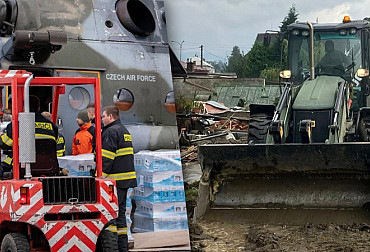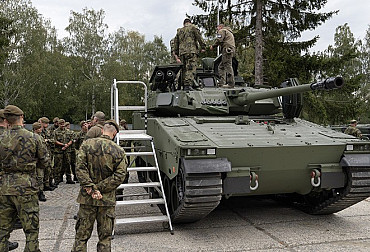Radios for the Army of the Czech Republic or to what extent the defence should support domestic producers
The Ministry of Defence has been proclaiming the importance of supporting the domestic defence industry for a long time. The terms of purchase, including the offset programmes and percentage involvement of domestic (often state-owned) companies in the production processes of future acquisitions (for instance, the new BVPs) are clearly specified in the acquisitions. Nevertheless, the situation is different in case of the direct purchase of radios from the American company L3Harris for 80 million Czech Korunas.

Picture: Harris radios are nothing new in our Army. The first purchase of these radios took place eight years ago and was meant for our soldiers operating in Afghanistan so that they would be able to easily communicate with the American colleagues. (Illustrative picture) | Harris Corporation
Harris radios are nothing new in our Army. The first purchase took place eight years ago and was meant for our soldiers operating in Afghanistan so that they would be able to easily communicate with the American colleagues. Since then, thousands more of these radios have been purchased.
Our Army, among other things, also uses Czech radios from the Mesit company that was a major supplier of the Czech Army until recently. Michal Hon, the Director of the Mesit company, has told the daily paper Právo recently that the Harris company was a global giant which they were not able to compete with. “Nevertheless, we have tried to convince users, who have fallen in love with this American solution of joint operations in Afghanistan, about the benefits of at least partial involvement of a local supplier, unfortunately without success,” said Hon. “Today, we have such products that, in cooperation with a German partner, we supply the German or British Army. However, the Czech practice of supporting the strategic industry is that we have decided on a certainly high-quality American solution but without any involvement of the Czech industry,” said Michal Hon, the Director of the Mesit company.
His words are also supported by Jiří Hynek, the Chairman of The Defence and Security Industry Association of the Czech Republic (DSIA). “We call this ‘harrisation’ of the Czech Army. We have nothing against the Harris radios or the preference of the Czech Army. Nevertheless, I am sorry that Harris did not find any production partner in the Czech Republic. The Coronavirus crisis today has clearly shown that when we needed something from abroad, it did not have to work. And the absolute dependence – in a strategic sector such as communication – on a foreign supplier is wrong,” said Hynek.
On the other hand, the spokesman of the Ministry of Defence, Jan Pejšek, counters: “The devices should ensure a reliable connection in complex climatic and geographical conditions and ensure the required interoperability with coalition partners,” said Pejšek. He also added that no Czech supplier offers devices with these parameters certified for the use within the NATO.
The General Staff also used a sharp rhetoric six years ago when it said in one of its statements: The Army of the Czech Republic should not become a hostage or means of competition between domestic and foreign companies.
It is not out of the question to look at some of the reactions of the soldiers themselves regarding the degree of involvement of the Czech industry. The soldiers are the end users of the purchased equipment. Thus, they are able to evaluate its qualities and shortcomings quite objectively. Then, we could summarize their opinions in the sentence that not everything domestic can be good. Therefore, lots of products of domestic companies are objectively compared with foreign products by the soldiers themselves. Regarding the radios for the Army of the Czech Army, the Lieutenant Colonel Ivo Zelinka, the Deputy Commander of the 43rd Airborne Regiment, made it perfectly clear on the social network: “The reason why the whole NATO has been using either Harris or Thales is clear to everybody who knows a little about it. God save us from the Czech solution…,” says Zelinka and his words are supported by other soldiers who point to the fact that many domestic companies have literally fallen asleep for a while.
Therefore, the question remains to what extent the Army or Ministry of Defence should support the Czech industry. Apparently, it should not be at all costs, especially if the level of the Czech products does not reach the required quality that can be offered by foreign competitors.





















